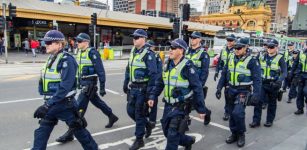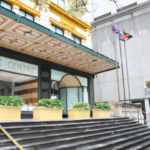Brutal Arrest Video Leads to Calls for Action

Earlier this week, footage was posted of a brutal arrest on the Gold Coast, where a police officer is seen delivering multiple blows to a 22-year-old man while he is pinned to the ground (above).
It was Valentine’s day, and Paul Folasa had just observed his cousin’s arrest. Folasa is shown in the video with his hands in his pockets, asking police where his cousin is going to be taken.
Suddenly, police turn on him and – rather than retaliate or defend himself – Folasa keeps both hands in his pockets, making it clear he is no threat, and tries to side-step away. He is nevertheless grabbed and thrown to the ground, narrowly avoiding hitting his head on the corner of a concrete garden bed. He is pinned to the ground by two officers while one of them delivers a heavy elbow and four punches to his head. At no stage does Folasa retaliate or even attempt to defend himself. Others are heard pleading for police to stop, telling them the incident is being filmed.
Folasa was later charged with public nuisance, obstructing police and an assault police charge – common practice after police assault members of the public. Many have pointed out the irony of the charges in light of the video. The case follows a number of similar incidents involving police brutality across the country in recent months.
Outside court the next day, Ray Currier, a man who says he was assaulted by police during an arrest in 2015, accused police of acting like thugs.
“It makes me really, really angry, especially for the young people on the Gold Coast,” Mr Currier, told reporters. “I didn’t want to make it about racial profiling but the evidence speaks for itself. This is the fourth case that I’m aware of. How many are we not aware of?”
According to a Queensland Police spokeswoman, an internal investigation has since been launched – although the offending officer has not been suspended from duty.
Police Investigating Police
The system of police ‘oversight’ in Queensland – which sees the majority of complaints against officers dealt with by other police – has come under fire in recent years. Many point out that a body which investigates itself is not truly accountable, and that the danger to the public is compounded by the fact that police officers are armed with lethal weaponry and enjoy ever-increasing powers.
It’s barely any better across the border in NSW. In September last year, it was revealed that no police officer in NSW has faced disciplinary action following internal investigations into critical incident complaints against them. Figures tabled in NSW Parliament show there was no disciplinary action taken against any police officer involved the 62 critical incident investigations conducted between January 2013 and August 2015. Such investigations are launched by police when death or serious injury is caused to a civilian or police officer during the course of a police operation.
“You’ve got a fundamental conflict of interest when you’ve got one police officer of the same force investigating a fellow police officer,” David Shoebridge, a Greens MP, said.
“And that conflict of interest makes it next to impossible to have genuinely independent oversight.”
Victims have the ability to make complaints to the NSW Police Ombudsman, but his resources are extremely limited when it comes to conducting investigations. In fact, more than 3,000 complaints are made to the NSW Ombudsman against police every year. Significantly, the Ombudsman has no power to discipline officers – let alone charge them for any offence – even if there is an adverse finding.
The NSW Government has recently announced plans to overhaul the state’s system of investigation, and create a single independent body to handle complaints against police. However, this will not occur until 2017, and the nature of the body’s composition, powers and procedures is yet to be revealed – with some fearing it will be another “ex copper’s club” like WA’s Corruption and Crime Commission.
Reasonable Force
Police are not legally permitted to use anything more than ‘reasonable’ force to place ya person under arrest. However, what is considered ‘reasonable’ can vary depending on the circumstances.
If you are suspected of a minor non-violent offence, and are not resisting arrest, ‘reasonable’ could mean holding your arm, or placing a hand on your shoulder. On the other hand, if you are violently resisting or threatening police officers, ‘reasonable’ could mean pinning you to the ground or subduing you. At all times, the force applied must not be more than what is necessary to arrest you.
It is hard to imagine, therefore, how anyone could possibly interpret the conduct of the Queensland officer in the recent video as ‘reasonable’ – considering he was delivering blows while Mr Folasa was already pinned to the ground, and given the absence of any violent conduct by Folasa.
Lodging a Complaint Against Police
If you wish to make a complaint against a police officer, you can do so by contacting the NSW Ombudsman or by writing to the customer assistance department of NSW Police Force.
Formal complaints need to be submitted in writing and contain as much information as possible, including:
- Date, time and location of the incident.
- Your full name and address as well as contact information.
- The names and contact information of any witnesses.
- Any documentary evidence that could support your complaint.
- The names of the police officers that were involved, if known.
- What your expected outcome is from the complaints process.
- Anything else that might be considered relevant.
When submitting a complaint, it is important to be as accurate and concise as possible, and try to avoid profanity or emotional language, unless you are quoting what was actually said at the time.
Police are expected to have certain standards of professionalism and integrity when dealing with members of the public, and it is important they are made accountable for misconduct.






